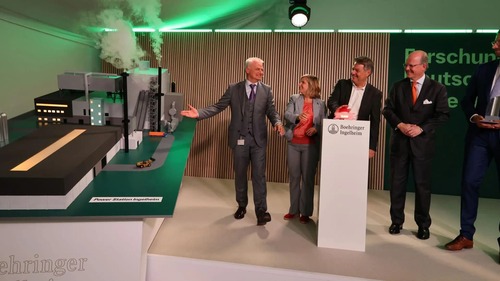Boehringer Ingelheim produces its own green energy in Ingelheim, Germany
Ingelheim, Germany – Boehringer Ingelheim inaugurated a biomass power plant at its Ingelheim site on Monday. With the new power plant, Boehringer Ingelheim is optimizing its energy supply and protecting the environment at the same time: Around 50,000 tons of CO2 are saved per year. The CO2 emissions of the site's own energy generation are reduced by 70%. In total, the company is investing EUR 205 million in sustainable infrastructure projects in Ingelheim and will be able to cover 95% of its energy requirements at the site from renewable sources in the future.
The Vice Chairman of the Board of Managing Directors, Michael Schmelmer, described the commissioning as a "significant milestone" for Boehringer Ingelheim and explained: "Part of our sustainability goals is to protect natural resources so that our earth remains a place worth living in for people and animals. With an environmentally friendly and more independent energy supply, we are ensuring stable production in order to be able to deliver medications for patients worldwide."
The ceremonial inauguration was attended by the German Vice Chancellor and Federal Minister of Economics Robert Habeck and Rhineland-Palatinate Environment Minister Katrin Eder.
Federal Minister for Economic Affairs and Climate Action Robert Habeck said: "The decarbonization of all areas of our economy is necessary in order to achieve global climate targets on the one hand and a reduction in energy imports on the other. Boehringer Ingelheim is a good example of this. The company uses renewable energies for production. It trains and attracts talents as an attractive employer. Last but not least, it invests heavily in research and development, thus contributing to better healthcare and future proofing of the site."
Biomass is an important source of renewable energy and is considered almost CO2 neutral. The waste wood used as fuel in Ingelheim is a waste product. It comes from the Rhine-Main area and is controlled according to strict quality standards.
Further measures for CO2 neutrality by 2030
The company has set itself the goal of making its business operations CO2 neutral by 2030. To this end, many individual projects are being implemented to save energy worldwide. By constructing more energy-efficient buildings, for example, the company has so far been able to save around 25% percent of its energy needs per square meter of floor space in Ingelheim. In Ingelheim, the company has also been operating its own solar park since 2023. Several other Boehringer Ingelheim sites are already certified as carbon neutral, for example in Dortmund (Germany), Gainesville (USA), Zhangjian (China) or Sant Cugat (Spain).
Categories
Countries
Latest news
Clariant's MegaMax™ 900 catalyst: Powerful start at European Energy's e-methanol plant
European Energy successfully started up their e-methanol plant in Kasso, Denmark, using Clariant’s MegaMax 900 catalyst. The Power-to-X plant is one of the world’s first and currently largest comme...
Kazakhstan’s largest petrochemical project: first piles driven for polyethylene plant in Atyrau
The construction of the plant, which has a capacity of 1.25 million tons of polyethylene per year and an investment of approximately 7 billion US dollars, is expected to be completed by 2028, with ...
Vynova Alkoxides GmbH awards first basic engineering contract for new alcoholates plant at the Lülsdorf site in Germany.
Vynova starts the construction of a new alcoholates plant at the Chemiepark Lülsdorf. A contract for basic engineering has been awarded to an external engineering company for finalising the basic d...
Norway: TotalEnergies and partners launch the 2nd phase of Northern Lights CCS project
Northern Lights will increase its CO2 storage capacity to more than 5 Mt per year. Northern Lights signed a commercial agreement with Stockholm Exergi for transport and storage of 900 kt CO2/y, fro...
